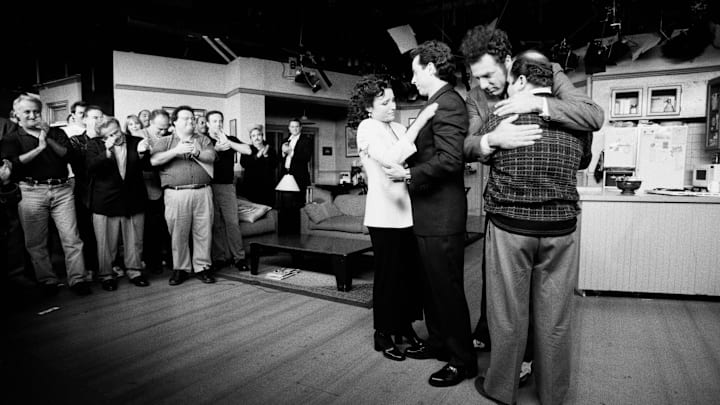It's never fun to say goodbye to your favorite show, and in May 1998, Seinfeld fans were faced with a bittersweet farewell. After nine seasons on the air, 10 Emmy Award wins, and enviably high weekly ratings, Jerry Seinfeld decided to end the popular sitcom with season 9. However, NBC wanted the series to continue and offered millions of reasons for Jerry to say yes.
The beloved sitcom didn't always start out at the top, even though it climbed its way to the peak of the ratings rankings and became one of the most enduring comedy classics of all time. Seinfeld premiered on NBC on July 5, 1989 as The Seinfeld Chronicles and continued with four more episodes in May 1990. Talk about an unconventional way to launch a television series!
Following the five-episode first season, the sitcom went a bit more traditional with its rollout as its 12-episode second season debuted in January 1991 and rolled right into its 23-episode third season that fall. From there, the show was an unstoppable force, eventually peaking as the No. 3 show on television with its fifth season and reaching the peak with seasons 6 and 9.
So, if Seinfeld was such a massive ratings hit in its final season, why did the series even come to an end? And if the network was offering Jerry Seinfeld millions of dollars to continue producing episodes of a show everyone loved, why would he walk away? Well, for the actor and comedian, the decision was a tough one to make but at the end of the day, it was simple.
Jerry wanted Seinfeld to go out on top
The New York Times reported on the show's ending after season 9 on Dec. 26, 1997, meaning superfans of the series probably weren't too pleased that Christmas. At the time of the announcement, Jerry was quoted as saying, "I wanted to end the show on the same kind of peak we've been doing it on for years. I wanted the end to be from a point of strength. I wanted the end to be graceful."
From that standpoint, the decision to end the show became a matter of creative preservation and never wanting to overstay their welcome just because the seat at the table was available to them. One thing's for sure, you never want to make something just to make it and risk losing quality control. The audience will always notice a decline in quality and leave in droves.
While appearing on The Howard Stern Show in 2013, Jerry opened up about his decision to end the show after its ninth season, when the series seemed to only be reaching its peak in success. Stern asked if it was the "ultimate integrity" to turn down NBC's $110 million offer to make more Seinfeld. Jerry countered that he could have made more and accepted Stern's compliment that integrity played a part in his decision.
"The love affair between the people that were making the show and the audience was so intense, it was so white hot, I had to respect that, and I could not go to that point where it starts to age and wither," he said.
In the interview, Jerry said he knew the timing was right and that he and the whole cast had sat down and talked about the $110 million offer together. Although there had been a small bit of behind-the-scenes strife between the season before over salary renegotiations, by the time their series came to an end, the cast was once again a united front for their final bow.
Jason Alexander opened up about the end of the series on the At Home with the Creative Coalition podcast in October 2020 and echoed The Bee Movie actor's sentiments regarding timing the ending to avoid audience exhaustion. While the cast knew they could come back and make a funny show, they wondered whether doing just that was worth it.
"The obstacle was that — after nine seasons ― the audience could more or less anticipate how any of these characters would react in any given situation. There was nothing new we could do to these characters and still have it be ‘Seinfeld.’"Jason Alexander
The actor, who played George Costanza in all nine seasons of the show, continued by saying, "The mutual thought was, ‘Why don’t we tuck it in before the audience says this kid’s been up too long.'" Once again, quality control was at the top of their minds over the potential financial benefits of continuing the show with season 10 and even quite possibly beyond.
And the rest, as they say, is history. The series concluded on May 14, 1998 and with its 76.3 million viewers, the show's final episode remains the fourth most-watched series finale of all time, behind M*A*S*H, Cheers, and The Fugitive. While fans would have loved for there to be more seasons, Seinfeld leaves behind a lasting legacy and 180 episodes. A lot of shows can't say as much.
All nine seasons of Seinfeld are currently available to stream on Netflix.
